Archives
- 01/01/2004 - 02/01/2004
- 02/01/2004 - 03/01/2004
- 03/01/2004 - 04/01/2004
- 04/01/2004 - 05/01/2004
- 05/01/2004 - 06/01/2004
- 06/01/2004 - 07/01/2004
- 07/01/2004 - 08/01/2004
- 08/01/2004 - 09/01/2004
- 09/01/2004 - 10/01/2004
- 10/01/2004 - 11/01/2004
- 11/01/2004 - 12/01/2004
- 12/01/2004 - 01/01/2005
- 01/01/2005 - 02/01/2005
- 02/01/2005 - 03/01/2005
- 03/01/2005 - 04/01/2005
- 04/01/2005 - 05/01/2005
- 05/01/2005 - 06/01/2005
- 06/01/2005 - 07/01/2005
- 07/01/2005 - 08/01/2005
- 08/01/2005 - 09/01/2005
- 09/01/2005 - 10/01/2005
- 10/01/2005 - 11/01/2005
- 11/01/2005 - 12/01/2005
- 12/01/2005 - 01/01/2006
- 01/01/2006 - 02/01/2006
- 02/01/2006 - 03/01/2006
- 03/01/2006 - 04/01/2006
- 04/01/2006 - 05/01/2006
- 05/01/2006 - 06/01/2006
- 06/01/2006 - 07/01/2006
- 07/01/2006 - 08/01/2006
- 08/01/2006 - 09/01/2006
- 09/01/2006 - 10/01/2006
- 10/01/2006 - 11/01/2006
- 11/01/2006 - 12/01/2006
- 12/01/2006 - 01/01/2007
- 01/01/2007 - 02/01/2007
- 02/01/2007 - 03/01/2007
- 03/01/2007 - 04/01/2007
- 04/01/2007 - 05/01/2007
- 05/01/2007 - 06/01/2007
- 06/01/2007 - 07/01/2007
- 07/01/2007 - 08/01/2007
- 08/01/2007 - 09/01/2007
- 09/01/2007 - 10/01/2007
- 10/01/2007 - 11/01/2007
- 11/01/2007 - 12/01/2007
- 12/01/2007 - 01/01/2008
- 01/01/2008 - 02/01/2008
- 02/01/2008 - 03/01/2008
- 03/01/2008 - 04/01/2008
- 04/01/2008 - 05/01/2008
- 05/01/2008 - 06/01/2008
- 06/01/2008 - 07/01/2008
- 07/01/2008 - 08/01/2008
- 08/01/2008 - 09/01/2008
- 09/01/2008 - 10/01/2008
- 11/01/2008 - 12/01/2008
- 01/01/2009 - 02/01/2009
- 04/01/2009 - 05/01/2009
- 07/01/2009 - 08/01/2009
- 09/01/2009 - 10/01/2009
- 10/01/2009 - 11/01/2009
- 11/01/2009 - 12/01/2009
- 12/01/2009 - 01/01/2010
- 03/01/2010 - 04/01/2010
Utopian Turtletop. Monsieur Croche's Bête Noire. Contact: turtletop [at] hotmail [dot] com
Tuesday, January 30, 2007

Watched part of The Wizard of Oz last night and was blown away anew by the wealth of emotional detail in the acting, the swiftly changing skies of consciousness registering on the actors' faces -- the whole cast -- really amazing -- Judy of course, and the brilliant Bert Lahr, and the Tin Woodman and Uncle Henry and Miss Gulch/Wicked Witch and Billie Burk as Glinda and to a slightly lesser extent the Scarecrow and Aunt Em -- but really blown away by Frank Morgan in the title role, especially his early scene as Professor Marvel, how he buffaloes Dorothy into going back home, the kindness and the pity and the guile, the quick sizing up and improvising and being surprised and thinking.
Later acting styles influenced by the Method bally-hooed their own "realism," but they aren't more real, unless emotional reality is really more monochromatic than I feel it; the distinction feels more like that between "emotion" and "mood" or between "baroque" and "romantic" -- not that the great method actors are one-note-John-and-Joanies, but that they don't emphasize rapidity of emotional consciousness; and I wouldn't even say that I prefer the older style to the newer style (except maybe I do); what I would say is that I do so love that older style when astute and gifted actors played it -- good actors of any style bring physical reality to emotional life in ways that language can only evoke and describe, not embody. (Music being maybe somewhere in between acting and language -- Nietzsche's late-career critique of Wagner that he was a mere actor and therefore not to be trusted artistically.)
After talking about the band Boston with a friend (we both like them), I laughed at the idea of naming my band Seattle.
Later I said to the four-year-old, "I'm thinking of naming my band 'Seattle.' "
He cracked up and said, "That's silly!"
And he doesn't even know very much rock history!
Yet.
(And instead of a flying guitar-ship, we could just use an image of the Space Needle Rocket taking off for the cover!)
Friday, January 26, 2007
We decided that the figure wrapped tight in a blanket lying in the backseat of the car must have been a woman, because the blanket was more brightly colored than most men would choose, and because there was a bottle of lotion on the back window sill of the car. Most men don't care about their dry skin.
We wouldn't even have noticed her, parked on the side street under the bright light, except that we were looking in all the cars as part of the one-night street-count of the homeless.
Parked under the bright light for safety.
Time for bed. Home, bed, roof, blankets. Stupefyingly sorrowful that we must count these as blessings.
We wouldn't even have noticed her, parked on the side street under the bright light, except that we were looking in all the cars as part of the one-night street-count of the homeless.
Parked under the bright light for safety.
Time for bed. Home, bed, roof, blankets. Stupefyingly sorrowful that we must count these as blessings.
Thursday, January 25, 2007
why is Nat not washing himself?
because the letter H went skiing.
why did the letter H go skiing?
because it wanted to get away from all of the bananas.
why did it want to get away from all the bananas?
because the number 7 had too many ladybugs in her garden.
why is Nat not washing his hair?
because the letter R went skiing.
why did the letter R go skiing?
because it was afraid of the oranges.
why was it afraid of the oranges?
because the letter X had too many earrings in her garden.
why is Cookie Monster not getting dressed?
because the letter S went skiing.
why did the letter S go skiing?
because it was afraid of all the grapes.
why was it afraid of the grapes?
because the letter garbage planted too many pieces of soap in her garden.
* * *
tonight's bathtub song started when Nat (the protagonist who wasn't washing himself) wanted more jokes about letters and numbers after I had made one up -- "if you drink too much of the letter T you have to go letter P" -- and followed it up with an old chestnut -- "Why is 6 afraid of 7? Because 7 ate 9" -- and he didn't really get the jokes but thought they were hilarious nonetheless and requested one about a letter, a number, and a plant. so I made up the first verse as a narrated joke -- actually, the interstitial questions were Nat's -- and he thought it was hilarious, and so he wanted another one, and I said, no, let's make it a song, and I sang it, and then he wanted another song, and I said it was his turn to make one up, so he made up the next two, which I thought were hilarious, but maybe you had to be there.
we're booking studio time, I'm telling you.
because the letter H went skiing.
why did the letter H go skiing?
because it wanted to get away from all of the bananas.
why did it want to get away from all the bananas?
because the number 7 had too many ladybugs in her garden.
why is Nat not washing his hair?
because the letter R went skiing.
why did the letter R go skiing?
because it was afraid of the oranges.
why was it afraid of the oranges?
because the letter X had too many earrings in her garden.
why is Cookie Monster not getting dressed?
because the letter S went skiing.
why did the letter S go skiing?
because it was afraid of all the grapes.
why was it afraid of the grapes?
because the letter garbage planted too many pieces of soap in her garden.
* * *
tonight's bathtub song started when Nat (the protagonist who wasn't washing himself) wanted more jokes about letters and numbers after I had made one up -- "if you drink too much of the letter T you have to go letter P" -- and followed it up with an old chestnut -- "Why is 6 afraid of 7? Because 7 ate 9" -- and he didn't really get the jokes but thought they were hilarious nonetheless and requested one about a letter, a number, and a plant. so I made up the first verse as a narrated joke -- actually, the interstitial questions were Nat's -- and he thought it was hilarious, and so he wanted another one, and I said, no, let's make it a song, and I sang it, and then he wanted another song, and I said it was his turn to make one up, so he made up the next two, which I thought were hilarious, but maybe you had to be there.
we're booking studio time, I'm telling you.
Wednesday, January 24, 2007
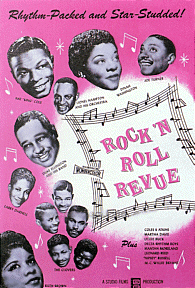 Been reading books about music; in the middle of some terrific ones, for some reason I put them down to read others more lightweight and not as terrific. Finished one of the latter today; last week finished two and jotted some notes on them. Here are the notes.
Been reading books about music; in the middle of some terrific ones, for some reason I put them down to read others more lightweight and not as terrific. Finished one of the latter today; last week finished two and jotted some notes on them. Here are the notes.* * *
Read Erik Davis’s 33 1/3 book on the album known as Led Zeppelin IV (which is officially titled something as un-typable as what Prince used to be styled when he was the Artist Formerly Known as Prince), a wacky and erudite exploration of Zep’s relationship with occult studies, practices, and imagery. A quick zip of a blast to read, Davis pulls off the improbable feat of a making a lyric-centric reading of Zeppelin fascinating and compelling.
Now, this, of course, is way off the mark. Not that the lyrics are uninteresting (though I’ve blasted them before, in pixels, on this blog), but that Zep’s downgrading of lyrics was one of their big breakthroughs. It’s true that “to be a rock and not to roll” is more than a merely clever line and does have Parmenidean overtones (Davis does not mention him but his discussion made me notice the line’s link to Parmenides), but always, what matters most with Zep is the SOUND. And, to be fair, Davis has decent respect for the magic of music, and Zep’s musical prowess.
But he repeats one of the ignorant biases of old-line rockcrit: He disses Bonham. “Ham-fisted,” he quotes Christgau, in one of Christgau’s dumbest lines. Davis mitigates this by quoting a more musically-attuned critic, the late, lamented, and acute Robert Palmer: Zep and Bonham “swing like mad.” Make that, swung. First, swing is Everything, even more everything than timbre is everything. Second, Bonham could play lightly as well as thunderously swingingly – dig his 5/4 lilt on “Four Sticks.” In my mod-punk-jazz youth, I dissed Zep too, but it was a case of denial. I always loved them, but my allegiance to skinny ties made me deny them. A drummer friend of mine in high school called Bonham the greatest. I thought he was nuts. Now I don’t.
Davis’s book has the virtue of sending me back to the record, and it really is one of the peaks of AOR. Not a bad tune on the disc; all of them but “Going to California” strike me as inimitable masterpieces. (“Going to California” might strike me that way too, but for its closeness to the more florid and compelling “Battle of Evermore.”)
And, what nobody mentions, the record is pure pop. Davis is good on Page & Jones’s craftiness, but he misses one of the keys to the record: Bonham lays out a LOT. Page was a master of layering guitars, but the band as a whole had a tremendous knack for dramatic pop arranging, where the drums lay out for the climactic hook. “Been a long lonely lonely lonely lonely lonely lonely time.” Really exemplary throughout, and I bet their arranging scores extremely high on those computer programs that judge a record’s pop-potential.
A running joke/theme of the book calls the songs’ narrator “Percy,” after the British slang for penis and in echo of the Arthurian knight Parsifal, the holy fool. Davis’s joke: Plant’s persona is the penis as holy fool. Witty, but too condescending to bear repetition at book length. I’ve dissed Plant’s lyrics too, but usually I can’t make them out; usually the music invites me not to make them out; and musically, sonically, rockingly – that’s brilliant. When I can make out his lyrics, I’m growing to like them. I’ve repented my condescension to Plant’s poesy. “Stairway to Heaven” engages me (“bustle in your hedgerow” does sound incongruously silly; the Tolkien allusions in other songs do too) and he has many memorable lines.
If you’re interested in Page’s relationship to occult theorist Aleister Crowley, I recommend the book. I’ve never read much about Zep; this makes me want to read more by Davis (and to hear more Zep – still have never heard some of their stuff).
* * * * * * *
Ken Emerson’s breezy Always Magic in the Air: The Bomp and Brilliance of the Brill Building Era reads like a cheery, 200-some page magazine article, with less cynicism than most magazines and less weight than the best magazines too. Lots of bio-detail about the Seven Big Songwriting teams of the Brill era:
Goffin & King
Bacharach & David
Leiber & Stoller
Mann & Weil
Barry & Greenwich
Pomus & Schuman
Sedaka & Greenfield.
And lots about publisher / impresario Don Kirschner, and Phil Spector, and the gang.
But a few days later, I don’t remember much of it. But I enjoyed every bit of it, even Emerson’s cheery MOR sensibility, dropping his opinions just where several decades of rockcrit consensus would lead you to expect he would drop them – Monkees, untalented (I disagree); Bacharach, brilliant but schlocky when not hardened up by the influence of Black styles (disagree about the shlock); Black style, emotive (umm . . . ); Leiber & Stoller, brilliant (agreed); and so on.
Correction: I did remember a bit about the Monkees history that I hadn’t known: When the Monkees demanded their creative freedom, they only won it because the producer backed them up, and the producer was the conglomerate boss’s son. Emerson botches the story and the history there – he misses the salient fact that after the Monkees grabbed the brass banana, they continued to work with Boyce & Hart and Goffin & King. Nothing much changed.
And, I remember stuff about all of the songwriters that I hadn’t known. It’s a nice book. Recommended to Brill Building hounds who don’t know the history already, which I didn’t, much, though I’ve always adored the music; we covered “He’s So Fine” in high school, straight up, with a female friend singing lead; how I loved singing that “Doo lang doo lang doo lang”; a fond memory.
* * * * * * * * * *
In 1955, the date of the movie poster above, Rock 'N Roll hadn't calcified yet. Duke Ellington, Dinah Washington, Nat King Cole: rock 'n rollers.
Elvis and the Beatles and the Beach Boys and James Brown and Ray Charles agreed: They sang Broadway and Tin Pan Alley and jazz tunes as well as R&B and country.
Dylan and the Rolling Stones disagreed. They disdained that stuff. (Wait, no; not that simple; the Stones covered a song associated with Nat King Cole, "Route 66"; but that was anomalous.)
Dylan and the Stones won the argument. (And Pete Seeger would have approved, at least back then.) No genteel music, please.
Funny: jazz used to represent un-genteel.
(Borrowing the genteel / vulgar distinction from a terrific essay by John Rockwell on Burl Ives.)
Now rock is genteel, and for decades, rock critics have used the snobby rhetoric of gentility to mock the old genteel style: "shlocky," "over-emotional," "kitsch."
Ah well, life is funny. What can a poor boy do?
Tuesday, January 23, 2007

"Michael Bumgarner, a resident at the Aloha Inn, is examined by University of Washington
students Angel Mathis, left, and Jessica Hunsberger at a free weekly health clinic."
Sunday, January 21, 2007
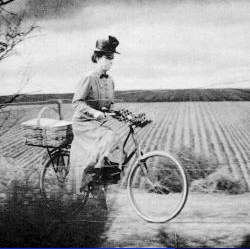
everything's fine, everything's fine, and then all of a sudden i'm struck with tears. telling the story of the Wizard of Oz to the kid, and getting to the part about the not-nice neighbor, Miss Gulch, who threatens Dorothy's dog, and all of a sudden i'm teary-eyed, thinking, what could have happened to her that she is so unhappy? by the end of the story and there's no place like home, the tears are really coming, i hide them from the kid, don't want to alarm him, don't want to call attention to myself.
and everything's fine.
* * *
the other day, listening to Michel Legrand's soundtrack to The Thomas Crown Affair, the original version, and Noel Harrison (Rex's son) singing the opening song (i've never seen the movie), "Windmills of Your Mind," and the paranoid line, "why did summer go so quickly, was it something that you said?", and Harrison's quiet urgency the most effective i've ever heard on the song (Memphis Dusty's version included), and the line, "lovers walk along the shore and leave their footprints in the sand," and i think of childhood family summer vacations on Lake Michigan and start sobbing.
* * *
my dad has been my dreams twice in the last two weeks -- nothing gruesome or even striking, just imagined, undramatic scenes from the months before he died. recently it struck me -- he's going to be dead for the rest of my life. i knew that, but it struck me anew.
* * *
time gives and time takes away. it's so easy to focus on the losses because they strike so hard, but they wouldn't be possible without the gains.
* * *
i've always been a cryer. since adulthood, anyway. as a male adolescent and pre-adolescent, crying was to be avoided. how many males of my cohort fought back tears watching Brian's Song? (soundtrack by Michel Legrand.)
* * *
the first time i saw my dad cry, he was telling his mother-in-law that his father-in-law had had a major stroke. we spent summers with my mom's parents. my dad was never super-affectionate with his parents-in-law, but he lived with them and loved them very deeply.
* * *
January melancholy -- it's OK. time of stock taking. in the days after Christmas, I came down with a bug and didn't blog for a few days, and I realized I didn't miss it; then, I posted again and realized I really enjoy it. In the first three years of the blog, I posted four or five times a week most weeks, sometimes six, except when I was away. But I'll probably be posting less frequently in the foreseeable future -- maybe three times a week. It might end up being more, but I hope not.
Michael Berube, who recently retired from blogging, wrote in his envoi about how blogging is a great pre-occupier; how one is always sifting experience for blog-ability. This is true for me too, and I'm hoping to be pre-occupied with other pre-occupations. I'm going to see if I can keep a lighter blogging schedule and free up some soul-energy for other things. We'll see how it works out. I'll keep you posted.
Thanks, as ever, for dropping by. And, even in times of melancholy, one hopes for spells of cheer, and my hopes on this score have been fulfilled; so, cheers --
Thursday, January 18, 2007
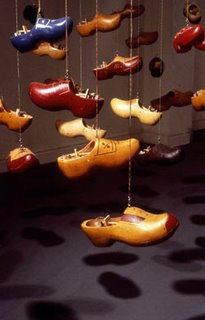
BIRTHDAY PARTY, TRIMPIN, and the IMPORTANCE of TOY GARBAGE
Saturday was the kid’s 4th birthday. He had his first kids-oriented party. He invited his pre-school class. Three showed up, parents in tow, plus our neighbor with two kids (one a few months younger than ours and one a toddler), and another good friend with her toddler.
The good friend with the toddler had commended to my beloved spouse a memory from her childhood, when her mother had made her a shiny costume which she loved. So my beloved spouse bought plastic tubes and tin foil and gathered cardboard boxes, and all the kids made robot costumes. Everybody had a great time. Face painting too. And it was nice to meet some of the kids and parents from our kid’s school. Nice people.
After the party we took our friends S & L out to dinner; they have watched our boy a number of times without remuneration, and our boy loves them, so we wanted to take them out. Our boy chose the restaurant, a very good one, though the food wasn’t his main object: he likes the Northwest Coast Native art there, and they give paper bear masks in Northwest Coast Native style to kids. He had said, “I want to go to the place where they give bear masks.” OK, maybe on your birthday. And so we did. Really nice day.
Our friend L had been to the previous birthday parties, and she remembered something from the 2nd birthday, the only one I neglected to commemorate on the blog. L said, “Nat was learning to talk, and he was very excited about the cake, and he kept saying, ‘Nat. Eat. Cake?’”
I had forgotten that, but she reminded me, and I was grateful.
* * *
The next day we saw a charming installation by Trimpin at the Frye Art Museum, called Klompen (photo above courtesy of the artist). 120 wooden shoes suspended from a frame, with computer-triggered mallets embedded in the shoes. A coin-slot accepts quarters, which activates a short (45 seconds or so) percussion piece composed and programmed by Trimpin. Lively charming pieces; we heard a couple dozen of them, and never a repetition.
Of the pieces we heard – and I’m not sure how many he programmed – Trimpin limits the possibilities to 5 or maybe 10 shoes per piece. I would have liked more variety within one piece, but his choice kept the pieces distinct from one another. He had scored the shoes, carving notches in them to get the pitches and tones he wanted.
It was Pop modernism, hooked with a visual gimmick, and set in a museum, where people talk through the pieces. But if you listened, the pieces held together, usually with a funky syncopated pattern but not always. I’ve said it twice, and I’ll say it again: Charming; really sweet. The kid loved it.
* * *
After the Trimpin exhibition my beloved spouse went to work and the kid and I walked back home. On the way we stopped at an international café chain headquartered in Seattle and named after a noble and perceptive but ineffectual character in Moby-Dick. I ordered a “non-dairy” kid’s hot cocoa for the kid. Non-dairy, because he’s allergic to dairy. “My son is allergic to milk,” I said.
When I picked the drinks up, I repeated my concern. “It’s non-dairy, right?” Yeah, no whip cream, said the barrista.
I should have pressed further, because Nat drank a whole cup of milk and burst out in hives from his toes to his face, his skin on fire, monstrously itchy, crying and crying hot tears, before we left the café. I carried him running the two blocks home, gave him anti-histamine, ran a cool bath, and called the Consulting Nurse. The nurse told me to bring him to urgent care, so off we went.
On the way to the hospital he started to doze off, which made me nervous, so before he fell asleep I said, “I’ll teach you a funny song.” And I started singing “A Hundred Bottles of Beer on the Wall,” which he thought was great; fortunately, he has not asked for it since. The doc checked him out, and he’s fine; the anti-histamine solved the problem; but jeepers the whole episode was a stress.
After we got home I called the café, and the manager remembered me and was properly horrified and apologetic. He asked how he could rectify the situation and I asked him to pay the $30 co-pay for the visit. He said come on down and gave me $30 cash from the till, not asking for verification, not asking for my name, not asking for anything. I told him that if we go over our four-visit annual limit to the hospital and have to start paying deductibles we would be back for more compensation, and he said, “Just let us know.”
As it happened, I still had the cup. And it said “No WC” – no whip cream – but it didn’t say “Soy.” I should have said, “Soy,” but in my ignorance I thought saying “non-dairy,” twice, and saying “allergic to milk,” would communicate the need for NO MILK.
I didn’t the keep the cup as evidence, but because of a joke. I was cleaning up to leave, before my son’s skin lit on fire, and I set his empty cup in my larger empty cup. He asked where his cup was. I showed him and said, “It’s like those Russian dolls we saw Christmas shopping. Russian coffee cups!” He laughed and said, “I want to show Mamu.”
I said, “I don’t think Mamu will laugh at your toy garbage.”
“Toy garbage” is a coinage of the kid’s. One day months ago, he was playing with some bit of detritus, and my beloved spouse entreated him to throw it away, telling him it was garbage and reminding him that he had plenty of toys, and he said he wanted to keep playing with his “toy garbage.” The term stuck.
So without thinking I kept the toy garbage because I told the kid we could take it home. And we’re keeping the toy garbage now in case we want to use it as evidence that some underpaid young person had a brief mental lapse that sent my son into severe discomfort and could possibly result in increased problems down the road but hopefully will not.
Monday, January 15, 2007
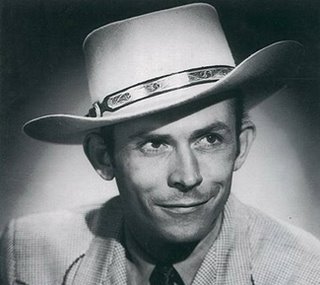
One wrote it, and the other, by singing it, made it traditional jazz.
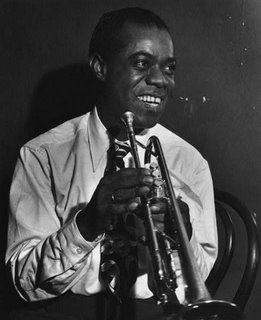
A few weeks ago I mentioned having heard the great New Orleans jazz drummer Shannon Powell sing "My Bucket's Got a Hole in It"; Mr. Powell brought out the pathos of the situation immediatly. Today I realized or remembered that Hank Williams wrote and recorded the song and that Louis Armstrong recorded it shortly afterward, lending his impramatur for any future jazz musician, particularly a New Orleansean such as Mr. Powell, who sang the most rueful and funny of the versions I have heard.
Thursday, January 11, 2007
Jan. 11 -- this blog is 3 years old today.
Probably light blogging for a while -- I have some things I need to take care of. Nothing alarming, just need to TCB, as the King used to say.
Thanks for dropping by, and cheers --
Probably light blogging for a while -- I have some things I need to take care of. Nothing alarming, just need to TCB, as the King used to say.
Thanks for dropping by, and cheers --
(Photo by Fingers Hilarity.)
Wednesday, January 10, 2007

One afternoon in the days after Christmas my beloved spouse was starting to doze but was interrupted by feeling chilly. She asked our son to please get a blanket for her. He went all out, and then he perched.
In 1942 the English singer Vera Lynn recorded "We’ll Meet Again", the words of which continue, " . . . don't know where, don't know when, but I know we'll meet again some sunny day," and it became a huge war-time hit in her country.
20-some years later, Stanley Kubrick used the record for the closing sequence of his nuclear-holocaust comedy, Dr. Strangelove, to accompany images of mushroom clouds and devastation.
Which reminds me of Adorno: "To write poetry after Auschwitz is barbaric, and this corrodes even the knowledge of why it has become impossible to write poetry today."
The Inquisition, the Middle Passage, the butchery of the first World War, centuries of colonization and enslavement and genocide -- Auschwitz had its particular horrorific details, but civilization had always been barbaric. I sympathize with Adorno's revulsion, but the barbarism he reacted to was new only in marginal ways.
For Kubrick, the chin-up hopefulness of his elders in a perilous time was fodder for joking. This style of sardonicism is still hip -- Michael Moore's Columbine movie does the same thing to "What a Wonderful World."
I wonder whether Michael Moore asked the band to play "Pretty Vacant" or "Me and the Devil Blues" during his wedding vows. Or "Beat on the Brat." After all, the world is violent and corrupt and evil; his and Kubrick's cinematic critique of love songs makes me think they think that love is false, impossible, evasive.
Still, Adorno's quote makes me think of Paul Celan, a great poet and survivor of the Concentration Camps. Here is a poem of his from the sequence "Breathcrystal," in a translation by Pierre Joris.
ERODED by
the beamwind of your speech
the gaudy chatter of the pseudo-
experienced -- the hundred-
tongued perjury-
poem, the noem.
Hollow-
whirled,
free
the path through the men-
shaped snow,
the penitent's snow, to
the hospitable
glacier-parlors and -tables.
Deep
in the timecrevasse,
in the
honeycomb-ice,
waits a breathcrystal,
your unalterable
testimony.
Monday, January 08, 2007

In response to concerns that the newly installed Democratic leadership of Congress would not follow through on non-existent pledges to "restore civility" to the political process, Speaker of the House Nancy Pelosi said, "The Republicans have nothing to worry about. We will treat our colleagues from the other side of the aisle with the same comity and collegiality that they have shown us for the last 12 years. We will treat the office of the Presidency with the same deference and respect that our Republican colleagues lavished on the last Democratic President. As former House Majority Leader Tom DeLay always said, 'You can get more flies with honey than with possum poop, and the people didn't elect us to stink up the place with the feces of slow-moving marsupials.' Like Tom, I have always cherished bi-partisanship above all, excepting civility -- civility and decorum."
She didn't really say that. Not any of it.
A couple-few months ago I rented the Marvin Hamlisch musical A Chorus Line, the movie of which I'd never seen, though I'd seen the stage show many many years ago. Some nice stuff all the way through, and one really good song, called "One," which has a great spooky dissonant orchestration in at least one of its renderings. Was mostly struck by how the show belied the old saw that Broadway hasn't had any influence on pop music since the '50s. It's simply not true. Broadway's dance moves have been all over teenpop and R & B's stages at least since the '80s.
Had my first experience with karaoke Friday night at the dinner party of the royal couple of dinner parties, our friends D & G. After dinner, they broke out the karaoke mic which plugged into their TV. Fingers Hilarity, the almost-4-year-old, sang "Yellow Submarine," and while he didn't remember the verses, nor could he read them, he wailed on the choruses. I sang Streisand's great Hamlisch-penned hit "The Way We Were"; other people sang other songs, and mostly we all sang together -- 13 adults and 2 kids at the party. It was a gas; much laughter and merriment. (I was not mocking the song -- I love that song.)
In the run-up to November's elections, we got a robo-call from Barbra Streisand, which tickled me pink -- the D party had ID'ed our household as loyal voters, and so Barbra called just to remind us to vote -- "Like me, I know you have very busy lives" -- so friendly! Then a couple of weeks later, still a ways before the election, Robert Redford called about some environmental issue. Not as friendly as Barbra, more directive; but my main reaction was, where's Marvin Hamlisch? Let's complete that The Way We Were -reunion action that's going on around here!
Another lovely luncheon party today at our friends' J & D's house, just the 5 of us. More music as J & I banged through folk songs from one of his songbooks, while Fingers Hilarity tootled on a wooden recorder, more or less keeping the beat. Such a pleasure to sing and play together.
* * *
Running errands late this afternoon, we passed a restaurant called "22 Doors." Fingers Hilarity read the sign and said, "22 Doors -- that's funny!" And he laughed. There weren't 22 doors there! What a funny sign! I admire his freshness of perception. Last night at the dinner table he had offered to help with something -- I don't remember what now, but it was something he would have no idea about; say, for example, a soaker hose (that wasn't it) -- and my beloved spouse said, "You wouldn't know a soaker hose from a hole in the ground," and Fingers Hilarity cracked up -- a hole in the gound! What a funny thing to say!
(A friend informs me that the restaurant 22 Doors does indeed have a collection of doors inside. I've never been. Next time Fingers and I are in the neighborhood we'll have to check it out.)
Saturday, January 06, 2007
 12th Night
12th NightChristmas music new to me this Season:
Christmas Here With You by the Four Tops. Lovely mid-'90s slick pop African American middle-class soul arrangements of classic songs and one nice original -- the title song -- and featuring Aretha Franklin in dramatic cameos on three tunes.
A Christmas Pops collection from the dollar bin with three fine & lively tunes called "Sleigh Ride" -- the mid-century American hit, originally written for orchestra by "light classical" star Leroy Anderson; and one each by Leopold Mozart and his son Wolfgang. Interesting! I hadn't known that the Mozarts had written tunes with that name.
A stirring and gorgeous collection of traditional carols and spirituals magnificently sung by Jessye Norman in lively and full-bodied arrangements by Bruce Saylor. Funny: Even though Saylor wrote all the arrangement, the CD booklet does not picture him, but the conductor -- and Norman, of course.
In a soulful take on "The Little Drummer Boy," Lou Rawls saltily brought out the pained empathy by the drummer for the baby Jesus in the line "I am a poor boy too." Which is another beautiful aspect of the story of the birth in a stable. God is poor and homeless.
* * *
Read Jody Rosen's lively & graceful book on Irving Berlin’s great hit song “White Christmas” last week-end: highly recommended for the remarkable story of an interesting and pretty song and for the description of the Irving Berlin's various milieux, as well as for Jody's beautiful description of the ambivalence of Christmas, and how people's expectations for joy and harmony are never completely fulfilled.
Jody is also bang-up on the melancholy undertow of Berlin's tune, which is prefigured in such moody traditional carols as "God Rest Ye Merry Gentlemen" (my favorite carol when I was a kid) and "Greensleeves" (a/k/a "What Child Is This?"). For decades Bing Crosby's recording of Berlin's perennial seasonal hit was the best-selling record in history -- not just the best-selling Christmas record, but the best-selling anything record.
"White Christmas" introduced a note of sentimental self-pity that was new to Christmas songs, a note which led to its wild popularity during World War 2. There had been secular Christmas hits before, notably Santa Claus Is Coming to Town, which sold 400,000 copies of sheet music in its first month in public, in November and December of 1934. But the 1934 hit failed to spark a trend in Seasonal Pop; it was left to "White Christmas" to lead the way.
Jody's great on the story of Jewish-American assimilation through the vehicle of showbiz, but I do think he overstates the dominance of the pop song field by Jews, admitting only Cole Porter to the rank of dominant songwriters of the classic Tin Pan Alley era. Hoagy Carmichael and the Anglicized Italian-American Harry Warren (born Salvatore Antonio Guaragna) surely belong on the list, as well as Fats Waller and maybe Duke Ellington.
A lovely tune which I don't tire of, but it was never one of my favorites. I've never been a weather fetishist, and there's something off and non-war-zone about those Christmas cards mentioned in the lyrics. Do very many single men send Christmas cards at all? Still, the song's flexibility must be a strength -- hundreds, or maybe thousands, of cover versions can't be wrong.
The saddest version I know is from a WW2 radio broadcast by the Glenn Miller Army Air Force Band. It comes as part of a heartbreaking medley for the big band augmented by a string section.
First up is "Silent Night" -- another darkly hued song -- in a hushed, lovely arrangement.
Then comes a wishful song called "I'll Be Home for Christmas," only it's not the same song as the famous one, it's a different song with the same title and the same theme, but not the same words or music, and not as memorable as the rival song on either account, but still effective. Sung smoothly by the band crooner.
Next is a rousing, swinging "Jingle Bells," the original and primal all-American Christmas Party song.
And last, a hushed, string-laden instrumental arrangement of "White Christmas," signifying that the "Jingle Bells" party is but a dream of a better time and place. The sober reality moment, the wind-out-of-the-sails moment, the party's-over moment. Berlin's song cuts deep, deeper with the words only echoing in memory and not being sung in the moment.
Wednesday, January 03, 2007
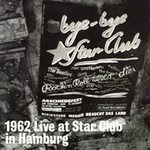 On the recommendation of Devin McKinney, I picked up a used copy of a bootleg of the Beatles' 1962 Hamburg Star Club recordings, with, according to these Amazon reviews, a fictionalized story of the tapes' provenance in the booklet, as well as nice pictures of the 4 fabs.
On the recommendation of Devin McKinney, I picked up a used copy of a bootleg of the Beatles' 1962 Hamburg Star Club recordings, with, according to these Amazon reviews, a fictionalized story of the tapes' provenance in the booklet, as well as nice pictures of the 4 fabs. What I hear:
1. The birth of the Rock Band as an Idea. Nobody had done it before -- an egalitarian singing-playing combo where the singing-players write their own songs. And this one has 3 solid singers (plus, though he doesn't sing on this recording, Ringo, who was himself a solid lead singer and whose singing I heart) and 3 solid writers. Rarely has the ideal represented by the Beatles even been remotely approached.
2. They were LOUD. A recording full of the din of squalling amplifiers and boom-y room noise and crowd buzz. In a way I'd never felt before, I HEAR their name, the BEATles. Boom boom boom!
3. BEAT being key -- Ringo rules the roost. It boggles -- and, yes, me being a persnickety sort, even offends me how the early rock critics dissed him as bumbling. He rules. Never mind his later invention of lyrical melodic rock tom-tom playing -- (his drumming on "A Day in the Life" reveals him as probably the most influential instrumentalist of the four of them; hundreds of singer-songwriter drummers found inspiration here) -- he ROCKED. Solid.
4. Those songs so many people have dismissed as corny that show up on 3 of their first 4 albums -- they really dug those songs; they were playing them in 1962. "Mr. Moonlight"! "A Taste of Honey"!
5. Paul's copping of Little Richard's style makes more sense in this context than in their polished-up studio recordings. Here -- the band is as wild as Paul wants to be, and he is too. On the studios, his Little Richard homages always sound stilted to me. (On the covers, that is. When he integrates the Little Richard style into his own stuff -- above all on "Maybe I'm Amazed" -- it's great.)
6. A Fats Waller cover! "Your Feets Too Big." When you're inventing rock and roll, anything you want can be rock and roll. These guys were omniverous.
7. The garage is the home of rock and roll. (Suburb as natural habitat of rock and roll?)
8. Contemporaneous northwest rock has a similar feel -- the Wailers, the Kingsmen -- except -- and it's a HUGE except -- the Beatles were writing great songs already ("I Saw Her Standing There") and -- another HUGE except -- all the Beatles were great singers.
9. I remember the why and wherefore of rockism -- how novel, how exciting, an egalitarian BAND writing its own stuff. Old hat -- cliche, even -- now, but then -- then it was Really Something.
10. I hear how old I am. I used to be in bands. Now I lead them. My individuation is too freaky and particular to accommodate a group identity like that. I'm happy to sublimate my individuation and be in somebody else's band from time to time, and I love having my own band, but negotiating a group identity? Not up for it any more.
11. The Beatles got too old too -- bless 'em. And -- note well -- they still played together after they broke up, just not as a GROUP.
12. Terrible sound quality, exciting music. But, in nostalgia of my own garage-y youth -- I love the terrible sound quality.
Note the record cover: no mention of The Beatles. (Actually, the Beatles are named, in small letters, and not on the CD spine.) Must be a bootleg. Glad to have it.
Tuesday, January 02, 2007
"Hitchin' a Ride" -- could anything be cooler?
"Last Night I Couldn't Get to Sleep at All" -- could anything sound more voluptuous?
Scott Joplin's "The Entertainer" from The Sting -- it sounded like liquid gold to me.
"Mandy" -- how beautifully sad!
I had piano lessons, and there was music around the house -- my mother and grandmother played the piano, my grandpa sang old, old songs in a garrish joyful voice. A favorite of the grandchildren's had these words:
Oh my sweet HortenseMusic in itself wasn't mysterious, but the beauty of these records remains so.
She ain't good lookin' but she got a lotta sense
She's got two teeth in her mouth
One faces east and the other faces south
* * *
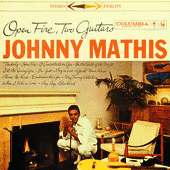
Last summer I got a box of my mom's old records that she didn't want any more. Have been slowly going through them. Johnny Mathis with two guitars and a bass, which Mom got in college (she wrote her maiden name on the front cover) -- pretty darn gorgeous. Great title too -- Open Fire, Two Guitars -- with a picture of a sweater-clad Johnny squatting in front of a living room's fireplace. So cozy and intimate!
* * *
 Which reminds me -- Jody Rosen has mentioned how few Christmas standards have emerged since the '50s or maybe '60s (Guaraldi's Peanuts music generated two standards), but there's been at least one -- and it's a doozy -- Donny Hathaway's sexy '70s Xmas tune "This Christmas" has been covered many many times now.
Which reminds me -- Jody Rosen has mentioned how few Christmas standards have emerged since the '50s or maybe '60s (Guaraldi's Peanuts music generated two standards), but there's been at least one -- and it's a doozy -- Donny Hathaway's sexy '70s Xmas tune "This Christmas" has been covered many many times now. And it has the funniest euphemism for fucking in any song ever -- "caroling." The word gets the climactic moment of the song, quite ecstatic in most versions -- "we're caroling through the night." Dude! Nothing stirs my blood like the prospect of caroling! Seriously -- you don't think Donny's all pumped up about "Hark the Herald," do you? ("Oh Come All Ye Faithful," maybe. Joyful and Triumphant. Oh come ye oh come ye . . . )Hang all the mistletoe,
I'm gonna get to know you better, THIS CHRISTMAS.
And as we trim the tree,
How much fun it's gonna be together, THIS CHRISTMAS.
Fireside is blazing bright,
We're caroling through the night.
* * *
This Christmas in our house was nice & mellow. Music parties Christmas Eve and Christmas Day at different friends' houses -- and a party animal of an almost-4-year-old allowing us to stay out both nights till 10:30 -- woo woo! Christmas Eve was an amazing dinner at the house of friends with a big crowd of people. I knew Dave played guitar but I'd never heard him play, so after dinner I hauled one of his guitars off the wall and started singing and trading songs with another songwriter there, a young single mother whose 5-year-old played very nicely with our almost-4-year-old for a few hours, and we finally talked Dave, the host, into playing some, and it was great. He brought out a stack of Bert Jansch LPs for me to admire first -- and admire them I did. (Love the way that guy claws the strings -- he snaps them -- grrrr!) And Dave finger-picked swell.
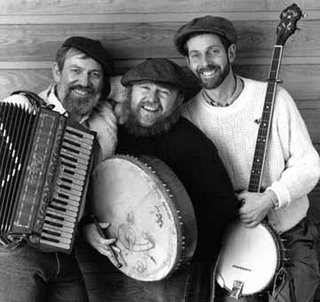
I tested out two songs I wrote for the abandoned November Album Project, and I tested one of them again at the next night's party, an annual Christmas hootenanny hosted by the accordianist and guitarist in the trad. Irish band Claypipe, Wayne, and his wife Joanne. I worked with Wayne at a homeless shelter 15 years ago, and I know the bodhran player, harmonica player, and singer extraordinaire Joe from housing activism. My new song didn't go over as well as I would have hoped -- ah well. I revised the lyrics the next day -- part of the point, I suppose. Claypipe rocked -- such good musicians.
For a long time I'd been mildly envious of a type of group singing that the Klezmatics achieve on some of their trad. Yiddish numbers -- a cappella singing with almost chthonic force. It turns out trad. Irish tunes trade in some of the same forces sometimes -- the whole room full of people shook the house singing with Claypipe on the choruses of the old song Johnny Jump Up. Joe sang the verses (and I don't know if they're the same as the ones I just linked to, but he sang a lot of them) and everybody wailed on the choruses, to the accompaniment of two galloping bodhrans in 3/4 time -- ONE-two-and-three-and-ONE-two-and-three-and-ONE.
Oh never oh never oh never againReally a blast.
If I live to be a hundred or a hundred and ten
I fell to the floor, I couldn't get up
After a drinking a quart of that Johnny Jump Up
Later that night I remembered that "Johnny Jump Up" was one of my mom's nicknames for me when I was a little kid -- and so of course I think this is the best song in the world.
I once asked Joe how many songs he "has" -- as in, "memorized."
He smiled. "Oh, about 300." And most of these are looooong songs. Irish songs of historical woe and/or drinking.
Me, astounded: "How do you remember so many?"
He gesticulated, oh-so-faux-nonchalantly, and smiled again, "It's like a Shakespearean actor . . . "
Fingers Hilarity, the party kid, had another great time, and he danced up a storm as Claypipe played. Danced and danced and danced. After a long spell of dancing he told something to my beloved spouse. In her words:
After fifteen minutes or so of this, Nat came to me with a smile and whispered in my ear: "I was pretending that I was dancing in my house I runned and runned and runned and the parachute landed and I runned the parachute and it landed right to a house and I ate all the candy canes in all the houses in the whole world." He remembered this vision clearly the next day.* * *
In the run-up to Christmas, I was missing my dad. Ever since I can remember, he made fudge every Christmas Season, to give to friends and to eat at home. I've been doing it for years now too, and I missed calling him up and talking about it. And he always cooked Christmas brunch at home, scrambled eggs and sausages -- and even though I had missed more than half of the Christmases of the last 15 years, I missed the idea of calling home and hearing about the scrambled eggs. This year my sister, as she did for Thanksgiving, organized the back-home-local family into a Different Pattern, and had our mother and brother to her house in Chicago for Christmas Eve and Christmas morning. I was glad that they did that, grateful for my sister's organizational capacity, when I remembered that for the last 20 years or so the family minister had come over for Christmas brunch as well. I knew he would have no trouble finding an alternative plan, but I wanted to let him know that I hadn't forgotten (even though I wouldn't have been there anyway) and called him a few nights before Christmas, leaving him a message wishing him a Merry one. Christmas night, before we went to the Christmas hootenanny, he called and said he'd had a very nice Christmas with another church family I've known for decades. In tribute to my late father's habits as a host, he told me, jocularly, "I didn't get my Bloody Mary out of it though."
I hadn't remembered the Bloody Marys. I'll have to have one next year.




